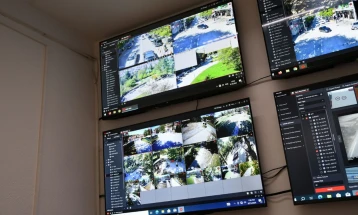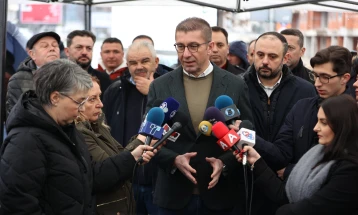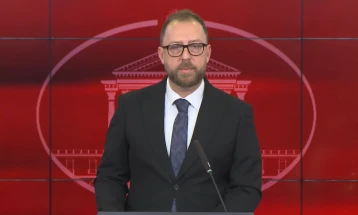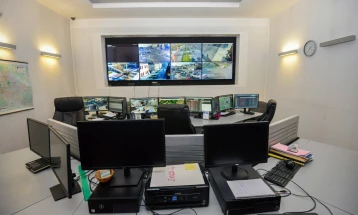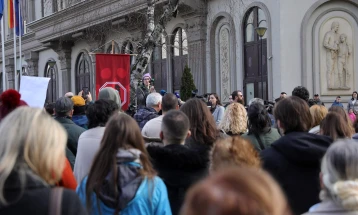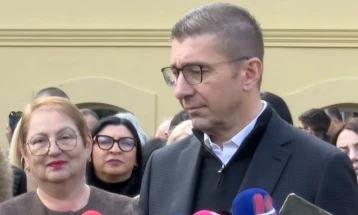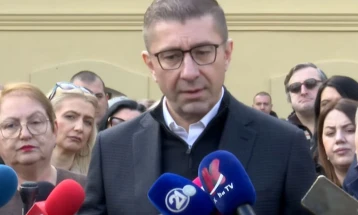Four generations of potters in the Trajkovikj family from Tabanovce
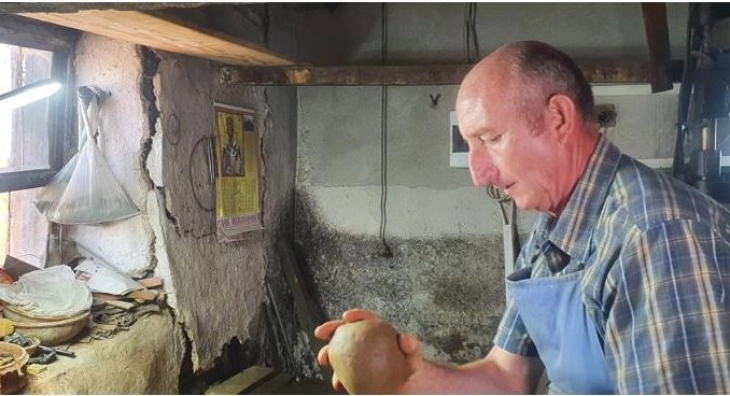
Kumanovo, 31 July 2021 (MIA) - Stojan Trajkovikj from the Kumanovo village of Tabanovce has been actively doing pottery for 30 years. He’s the fourth generation in his family who does this ancient trade, knowledge transferred from grandfather to grandson, from father to son, over the past 200 years.
The process is difficult and requires patience, which isn’t’ something 52-year-old Trajkovikj lacks. He works with great love and care. The process to make one product takes time. In an authentic ambience, in an old house, a garden surrounded by orchards, the clay production starts that Trajkovikj gathers from his home village Tabanovce and the nearby village Sopot. The clay is clean, it gets soaked, ground twice, then it’s prepped, drawn on, dried, cooked twice at 1,000 degrees in a hundred-year-old furnace. The process is simple, traditional, and the final product astounds with its beauty and simplicity.
Trajkovikj’s yard looks like a mini-Neolithic settlement, full of broken bits of pottery.
“I’ve been actively working since the ‘90s, having learned all the finesses of the trade as an assistant in my father’s workshop. We’ve been doing this for four generations, my father, grandfather and great grandfather before me. My grandpa sold his works on Nagorichki Sokak, my father on Leninova, and I sell on the Green Market,” Trajkovikj says.
 The products he has made, as well as his ancestors, decorate the cupboards of ambassadors of multiple countries.
The trade is hard, but it’s the family’s pride. In the past, there wasn’t a single house in the northeast that didn’t display a product made by the Trajkovikj family. 86-year-old Srboljub Trajkovikj says that there was high demand for his products. Women ordered pots and jars every day.
“Demand has become much smaller over the years,” the now-retired potter says.
The pandemic halved the demand for products, directly hitting the hospitality sector, and indirectly hitting potters. Demand from national restaurants which serve traditional food in earthen pots was halved.
“Professional chefs and housewives know that baked beans, village meat, potatoes etc., it all tastes better when it’s prepared in an earthen pot,” Trajkovikj says.
He says that the government should find a way to permanently subsidize the few remaining potters and dying trades.
The products he has made, as well as his ancestors, decorate the cupboards of ambassadors of multiple countries.
The trade is hard, but it’s the family’s pride. In the past, there wasn’t a single house in the northeast that didn’t display a product made by the Trajkovikj family. 86-year-old Srboljub Trajkovikj says that there was high demand for his products. Women ordered pots and jars every day.
“Demand has become much smaller over the years,” the now-retired potter says.
The pandemic halved the demand for products, directly hitting the hospitality sector, and indirectly hitting potters. Demand from national restaurants which serve traditional food in earthen pots was halved.
“Professional chefs and housewives know that baked beans, village meat, potatoes etc., it all tastes better when it’s prepared in an earthen pot,” Trajkovikj says.
He says that the government should find a way to permanently subsidize the few remaining potters and dying trades.
 “It’s a good thing that the trade chamber asked for subsidies that were accepted by the Ministry of Economy, because we were about to close up shop. It’s very important to protect old trades. The country should think about teaching trades in high school, give the students practical classes and follow the example of neighboring countries who permanently protected old trades,” Trajkovikj says.
The president of the Chamber of Traders, Agron Fazliji, says that added support is necessary for old traders, around 100 in the whole country, and they won’t overload the budget.
“This family is the country’s pride, four generations of potters. Traders were included in all the measures by the government and the Ministry of Economy. We’re slowly emerging from the crisis, but the old trades remain. It’s important to find a way to subsidize them permanently. They are good and valuable masters of their craft, the best ambassadors of our country abroad,” Fazliji says.
“It’s a good thing that the trade chamber asked for subsidies that were accepted by the Ministry of Economy, because we were about to close up shop. It’s very important to protect old trades. The country should think about teaching trades in high school, give the students practical classes and follow the example of neighboring countries who permanently protected old trades,” Trajkovikj says.
The president of the Chamber of Traders, Agron Fazliji, says that added support is necessary for old traders, around 100 in the whole country, and they won’t overload the budget.
“This family is the country’s pride, four generations of potters. Traders were included in all the measures by the government and the Ministry of Economy. We’re slowly emerging from the crisis, but the old trades remain. It’s important to find a way to subsidize them permanently. They are good and valuable masters of their craft, the best ambassadors of our country abroad,” Fazliji says.
 The Ministry of Economy says that they’re working continuously and implementing activities in order to increase competitiveness in the trade sector, including dying trades. Alongside the government, they secured financial support for monthly salaries amounting to MKD 14,500 for April, May and June 2020 and 17,410 for October, November and December, non-repayable for flat taxed traders. Traders also used funds from an interest-free credit line called COVID 3, as well as also getting subsidies for buying raw materials and equipment.
“The measure was meant to co-fund traders’ expenses through funding up to 60% of proven expenses, but no more than MKD 60,000 for the purchasing of tools and raw materials. MKD 20,000,000 were planned for this measure, but only MKD 8,873,019 were used. 225 traders were subsidized,” the Ministry of Economy said.
Funds were planned for February and March 2021 salaries, amounting to MKD 17,410.
The Ministry adds that subsidizing continues in 2021 for traders through funding 60% of proven expenses, but no more than MKD 120,000 used for getting equipment and tools, improving the workspace, implementing software solutions – 60% of proven expenses, but no more than MKD 60,000.
“MKD 6,000,000 are planned in order to realize this measure in accordance with the Program for Competitiveness, Innovation and Entrepreneurship,” the Ministry of Economy says.
The Ministry of Economy says that they’re working continuously and implementing activities in order to increase competitiveness in the trade sector, including dying trades. Alongside the government, they secured financial support for monthly salaries amounting to MKD 14,500 for April, May and June 2020 and 17,410 for October, November and December, non-repayable for flat taxed traders. Traders also used funds from an interest-free credit line called COVID 3, as well as also getting subsidies for buying raw materials and equipment.
“The measure was meant to co-fund traders’ expenses through funding up to 60% of proven expenses, but no more than MKD 60,000 for the purchasing of tools and raw materials. MKD 20,000,000 were planned for this measure, but only MKD 8,873,019 were used. 225 traders were subsidized,” the Ministry of Economy said.
Funds were planned for February and March 2021 salaries, amounting to MKD 17,410.
The Ministry adds that subsidizing continues in 2021 for traders through funding 60% of proven expenses, but no more than MKD 120,000 used for getting equipment and tools, improving the workspace, implementing software solutions – 60% of proven expenses, but no more than MKD 60,000.
“MKD 6,000,000 are planned in order to realize this measure in accordance with the Program for Competitiveness, Innovation and Entrepreneurship,” the Ministry of Economy says.
 95 applicants applied to the call, and 89 were approved. Traders can apply for the interest-free credit line COVID 4 that enables direct support for traders who pay income taxes and are registered in the Republic of North Macedonia, the Financial Support Fund and liquidity support – COVID 4.
“The FSF and COVID 4 that will realize this credit line were formed through funds from the country’s budget, amounting to MKD 615,000,000. This measure ensures that the interest rate for credit holders will be 0% yearly. The public call is still ongoing,” the portfolio ministry said.
Traders like Trajkovikj expect support to be permanently protected, because they reflect the past and national treasure.
Aleksandra Maksimovska
Translated by Dragana Knezhevikj
95 applicants applied to the call, and 89 were approved. Traders can apply for the interest-free credit line COVID 4 that enables direct support for traders who pay income taxes and are registered in the Republic of North Macedonia, the Financial Support Fund and liquidity support – COVID 4.
“The FSF and COVID 4 that will realize this credit line were formed through funds from the country’s budget, amounting to MKD 615,000,000. This measure ensures that the interest rate for credit holders will be 0% yearly. The public call is still ongoing,” the portfolio ministry said.
Traders like Trajkovikj expect support to be permanently protected, because they reflect the past and national treasure.
Aleksandra Maksimovska
Translated by Dragana Knezhevikj
 The products he has made, as well as his ancestors, decorate the cupboards of ambassadors of multiple countries.
The trade is hard, but it’s the family’s pride. In the past, there wasn’t a single house in the northeast that didn’t display a product made by the Trajkovikj family. 86-year-old Srboljub Trajkovikj says that there was high demand for his products. Women ordered pots and jars every day.
“Demand has become much smaller over the years,” the now-retired potter says.
The pandemic halved the demand for products, directly hitting the hospitality sector, and indirectly hitting potters. Demand from national restaurants which serve traditional food in earthen pots was halved.
“Professional chefs and housewives know that baked beans, village meat, potatoes etc., it all tastes better when it’s prepared in an earthen pot,” Trajkovikj says.
He says that the government should find a way to permanently subsidize the few remaining potters and dying trades.
The products he has made, as well as his ancestors, decorate the cupboards of ambassadors of multiple countries.
The trade is hard, but it’s the family’s pride. In the past, there wasn’t a single house in the northeast that didn’t display a product made by the Trajkovikj family. 86-year-old Srboljub Trajkovikj says that there was high demand for his products. Women ordered pots and jars every day.
“Demand has become much smaller over the years,” the now-retired potter says.
The pandemic halved the demand for products, directly hitting the hospitality sector, and indirectly hitting potters. Demand from national restaurants which serve traditional food in earthen pots was halved.
“Professional chefs and housewives know that baked beans, village meat, potatoes etc., it all tastes better when it’s prepared in an earthen pot,” Trajkovikj says.
He says that the government should find a way to permanently subsidize the few remaining potters and dying trades.
 “It’s a good thing that the trade chamber asked for subsidies that were accepted by the Ministry of Economy, because we were about to close up shop. It’s very important to protect old trades. The country should think about teaching trades in high school, give the students practical classes and follow the example of neighboring countries who permanently protected old trades,” Trajkovikj says.
The president of the Chamber of Traders, Agron Fazliji, says that added support is necessary for old traders, around 100 in the whole country, and they won’t overload the budget.
“This family is the country’s pride, four generations of potters. Traders were included in all the measures by the government and the Ministry of Economy. We’re slowly emerging from the crisis, but the old trades remain. It’s important to find a way to subsidize them permanently. They are good and valuable masters of their craft, the best ambassadors of our country abroad,” Fazliji says.
“It’s a good thing that the trade chamber asked for subsidies that were accepted by the Ministry of Economy, because we were about to close up shop. It’s very important to protect old trades. The country should think about teaching trades in high school, give the students practical classes and follow the example of neighboring countries who permanently protected old trades,” Trajkovikj says.
The president of the Chamber of Traders, Agron Fazliji, says that added support is necessary for old traders, around 100 in the whole country, and they won’t overload the budget.
“This family is the country’s pride, four generations of potters. Traders were included in all the measures by the government and the Ministry of Economy. We’re slowly emerging from the crisis, but the old trades remain. It’s important to find a way to subsidize them permanently. They are good and valuable masters of their craft, the best ambassadors of our country abroad,” Fazliji says.
 The Ministry of Economy says that they’re working continuously and implementing activities in order to increase competitiveness in the trade sector, including dying trades. Alongside the government, they secured financial support for monthly salaries amounting to MKD 14,500 for April, May and June 2020 and 17,410 for October, November and December, non-repayable for flat taxed traders. Traders also used funds from an interest-free credit line called COVID 3, as well as also getting subsidies for buying raw materials and equipment.
“The measure was meant to co-fund traders’ expenses through funding up to 60% of proven expenses, but no more than MKD 60,000 for the purchasing of tools and raw materials. MKD 20,000,000 were planned for this measure, but only MKD 8,873,019 were used. 225 traders were subsidized,” the Ministry of Economy said.
Funds were planned for February and March 2021 salaries, amounting to MKD 17,410.
The Ministry adds that subsidizing continues in 2021 for traders through funding 60% of proven expenses, but no more than MKD 120,000 used for getting equipment and tools, improving the workspace, implementing software solutions – 60% of proven expenses, but no more than MKD 60,000.
“MKD 6,000,000 are planned in order to realize this measure in accordance with the Program for Competitiveness, Innovation and Entrepreneurship,” the Ministry of Economy says.
The Ministry of Economy says that they’re working continuously and implementing activities in order to increase competitiveness in the trade sector, including dying trades. Alongside the government, they secured financial support for monthly salaries amounting to MKD 14,500 for April, May and June 2020 and 17,410 for October, November and December, non-repayable for flat taxed traders. Traders also used funds from an interest-free credit line called COVID 3, as well as also getting subsidies for buying raw materials and equipment.
“The measure was meant to co-fund traders’ expenses through funding up to 60% of proven expenses, but no more than MKD 60,000 for the purchasing of tools and raw materials. MKD 20,000,000 were planned for this measure, but only MKD 8,873,019 were used. 225 traders were subsidized,” the Ministry of Economy said.
Funds were planned for February and March 2021 salaries, amounting to MKD 17,410.
The Ministry adds that subsidizing continues in 2021 for traders through funding 60% of proven expenses, but no more than MKD 120,000 used for getting equipment and tools, improving the workspace, implementing software solutions – 60% of proven expenses, but no more than MKD 60,000.
“MKD 6,000,000 are planned in order to realize this measure in accordance with the Program for Competitiveness, Innovation and Entrepreneurship,” the Ministry of Economy says.
 95 applicants applied to the call, and 89 were approved. Traders can apply for the interest-free credit line COVID 4 that enables direct support for traders who pay income taxes and are registered in the Republic of North Macedonia, the Financial Support Fund and liquidity support – COVID 4.
“The FSF and COVID 4 that will realize this credit line were formed through funds from the country’s budget, amounting to MKD 615,000,000. This measure ensures that the interest rate for credit holders will be 0% yearly. The public call is still ongoing,” the portfolio ministry said.
Traders like Trajkovikj expect support to be permanently protected, because they reflect the past and national treasure.
Aleksandra Maksimovska
Translated by Dragana Knezhevikj
95 applicants applied to the call, and 89 were approved. Traders can apply for the interest-free credit line COVID 4 that enables direct support for traders who pay income taxes and are registered in the Republic of North Macedonia, the Financial Support Fund and liquidity support – COVID 4.
“The FSF and COVID 4 that will realize this credit line were formed through funds from the country’s budget, amounting to MKD 615,000,000. This measure ensures that the interest rate for credit holders will be 0% yearly. The public call is still ongoing,” the portfolio ministry said.
Traders like Trajkovikj expect support to be permanently protected, because they reflect the past and national treasure.
Aleksandra Maksimovska
Translated by Dragana Knezhevikj 